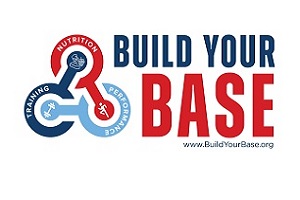The Coach
I began coaching when I was fifteen-years old. My 'athlete' was my ten-year old sister Mary. She was a pretty well coordinated kid and I was convinced she could be a good distance runner. The year before, my neighbor, Brad Peaseley, a good runner at John Marshall HS in Richmond, Virginia introduced me to running. It was the summer after our junior years and he was working out. I decided to run with him and try to keep up. Surprisingly, I did. This was the first "love of my life experience." Everyday we'd go out for a run and soon he was keeping up with me. My morning paper route was 3-4 miles long and I began delivering the papers, 173 daily and 245 Sunday (there was a war on and paperboys were in short supply, hence, large routes) on foot, running with a big sack of papers around my shoulders. It took twice as long but it was terrific. I began to get in to good shape. I convinced my Mom to let me transfer to John Marshall, as my high school didn't have a track team.
Mary became interested in what I was doing and wanted to try it. One day, with the temperature hovering around ninety, I had poor Mary doing repeats around our block. It was a big block, easily 800m all the way around. Just as she was finishing, beet red and gasping for breath, Mom came home with the groceries. She looked at my sister, screamed, "What have you done to your sister?!" Gave me a terrific slap across the back of my head and took Mary in for a cold bath. My first coaching lesson, do not overwork on hot days.
I graduated from the University of Virginia and went into the Army. I became the Battalion coach, football, basketball and track. I loved it. My basketball and track teams won the Fort Bragg titles and I learned my second, and by far, the most important facet of coaching; communicate with your athletes.
From the Army I went to Long Island and coached and taught for over 30 years. I met a lot of coaches, good, bad and indifferent and the purpose of this piece is to tell you something about each category. You may be considering coaching, I hope you are and I hope this helps.
Track coaches are usually selected for several reasons. Let's look at a couple.
The football/basketball coach needs some extra money. Some sports require knowledge of the sport, to most high school administrators; track is not one of them. All you do is tell the kids to go run, take a few starts, then lie in the grass, and talk football. Field events? Learn on your own. Hurdles? Same thing. So, an entire high school full of some potentially fine track and field athletes' lies fallow and those potential Olympians are never discovered. One athlete who became an Olympian came from a small high school in the Midwest but NEVER ran in an invitational. The coach told him 'I don't get paid to work on Saturday.' Another refused to drive his kid 45 miles to the airport so the kid could compete in the Nike Outdoor Nationals despite the NSSF offering to pay all the youngster's expenses. (The meet had a different name then but it's the same meet.) He also made the US team as a runner on the 4x400mR, winning a gold medal.
Some schools have a rule that the coach must work at the school thus eliminating any outsider who knows and loves the sport but is not a teacher. So an English, Social Studies, Science teacher takes the job too often not because they love the sport and want to learn more about it, no. They take it because it pays extra money. Another talent pool is eliminated.
In fairness, many of these folks make a sincere effort to become knowledgeable but they are in the minority. As you can see, a great many of our high schools have bad coaches.
Someone is offered the job as the track coach and they accept it with the best of intentions. They want to do a good job but suddenly discover to be a good coach you have to know an awfully lot. How to teach the start; how to hurdle; how to throw the discus, javelin, shot, how to pole vault, how to teach a kid how to run two miles�they quickly either become indifferent or they quit. If they stick it out, they realize they have to work a great many Saturdays. That's one of their days off.
There are other reasons for BAD coaches but these are the foremost. Who suffers? Our nation. How many Olympians have been missed due to the inaction of the above? No one will ever know. But trust me, it's quite a few.
Why do I say that? Consider, the USA has a population of about 300,000,000. We earn medals in only a few events. Nevertheless, we are so strong in those events that we usually land atop the medal list and brag about how great the sport is in the US. But basing the number of medals won in proportion to a nation's population finds the US closer to the bottom of the list than the top. Finland, Norway and other smaller nations easily outdo this country. Why? Most of our nation's youngsters never are properly coached.
What does it take to be a GOOD coach? First, and foremost, a love for the sport and a desire to learn more so the coach can help the kids under his/her charge. Next, absolute and total dedication. I once had a young woman whom I thought could win the New York State title in the 1500m. But, I felt she needed a good 800m race to have the best possible chance. Accordingly, she, my wife and I drove several hundred miles so she could get in a good 800m. I know, you're dying to know if she won. Yes. She beat the overwhelming favorite by running stronger over the final 300m than her opponent. How many coaches would do that? Not too many.
A willingness to learn. When I started my 33-year career, I didn't know much about the sport. I'd run the distances but I had a tremendous thirst for knowledge. Let me tell you how strong that thirst was. I'd take my team to a meet and hang around the coaches I KNEW were terrific. I eavesdropped picking up gems like this… a nationally ranked shot putter was having a bad day. Instead of his usual 60' + throw, he was hitting 55' and was in danger of not making the final of this particular meet. He came over to his coach, a great man and a great coach, Irv Mondschein. Despondently he asked, "Mr. Moon (the nickname for Coach Mondschein) Mr. Moon, what am I doin' wrong." Mondschein shifter his cigar around in his mouth, I edged closer, then came the answer. Putting his arm around the kids massive shoulders he replied, "John, you're letting the shot land too close to your feet." The young man broke away, a huge smile wreathed his face and he returned to the circle, threw 64'+ AND WON THE EVENT. OK, laugh; BUT I learned if you have the trust and confidence of the athlete and they know you as a friend as well as a coach, almost anything you say will be a big help.
Every clinic in my area saw me in attendance; I asked dozens of questions and learned. Not all coaches wanted to share their knowledge. One superb high school coach turned out great distance runners year after year. I asked him how did he do it. He said, and I quote, "We have a big field. Every day we run around it. When they can run it in 2 minutes, we add a lap. When they run it in 4 minutes�" You get the picture.
Other coaches were much more cooperative. Letters were written. A wonderful Swedish coach, Gosta Holmer, the man credited with creating a system of training known as "Fartlek" was sent one. My letter asked what it was and how did one do it. He sent a wonderful letter explaining all his thinking, why he did it, how it was done and how he felt I should use it in the training of high school athletes.
As I slowly learned my craft, my athletes got better and better. They sensed how much I cared about them, not just as athletes but also as people. Anyone who aspires to be a good coach must have this quality, a sincere caring for his/her kids.
Being tough is another necessity. One must realize you cannot be a top quality runner if you don't do top quality workouts. And some of those would cause pain…pain and suffering. One day we were running 800's outdoors when a slight sleet was falling, there was a sheen of ice on the ground and running was not only miserable, it was almost impossible. The WO called for eight to be run with eight minutes rest. After five the kids came in and one, Mike Hedgecock, had ice across his eyebrows. As spokesman for the group he asked, "Can we call it quits? It's terrible out there." How insensitive he must have thought when I just turned away and stared so coldly…then replied, "Three more…then we quit."
Mike still holds the New York State frosh record for the 2000m Steeplechase, 5:52.
You MUST challenge your athletes. When I began coaching females I NEVER once considered them any less talented nor possessed of less intestinal fortitude than the guys. The girls were constantly challenged to do things they didn't think they could do. And they learned just how good they could be. Their 11:55+ stood for a long time as a New York State record.
Not every athlete can be great. A good coach recognizes this and has the athletes set goals they can, with hard work, achieve. Thus, every kid can be a champion. To this day, and I've been retired almost 20 years, I still call the kids "Champ" when I am fortunate enough to see them. One more anecdote. There was a kid on the team who was easily the most uncoordinated kid who ever walked the face of the Earth. When he ran he moved his right arm and right leg at the same time! Just try that. We wanted him to get his letter (back then getting your letter was a big deal) but there was no way he could ever earn the 10 points necessary. However, if he were member of a winning relay team in a championship meet, he would earn the award. We had three splendid 800m runners on the team, Jack Rose, Jim Brown and Doug Walker, all about 1:55 - 1:58. We sat down and I explained Peter was going to run the anchor on our 4x800mR. They were aghast! It was explained this was the only way Peter, never Pete, could get a letter. Thus, the plan was made. They averaged a little over 1:57 for the first three legs and we handed Peter about a 398m lead. He won by about six inches. The kids carried him off the field.
How do you coach a truly GREAT athlete? Those types are few and far between. I've coached two Olympians but never worked with a finer athlete than Sarah Bowman, now entering her junior year at Tennessee. In my mind, Sarah is the greatest high school middle distance runner of all time. Every race she ran was against high school competition. She never had the chance to race against Open competitors. She still clocked 2:04.94 in April of her junior year; 4:17.61 for 1500m, #4-AT; 4:36.95 for a full mile, #3-AT and about 10:15 for 3200 though only running it twice.
The hardest part of coaching her had nothing to do with the physical WO's although she was awesomely tough. No, the most difficult task I faced was convincing her how good she was. After every WO, we would talk for 10-20-30 minutes with me constantly, albeit subtly, sending the message, YOU CAN BE GREAT. We were very close. To have a great athlete you MUST be close to your kid. When she went to the MD for a running related problem, I was there. When her hs coach (I was her private coach) became totally detached from reality, I was there. When she had other problems, I was there.
She KNEW she could count on me. We had complete and total trust in each other. If she said I don't think I can do this WO, I knew there was a good reason and we would do something else. I trusted her not to lie to me. When we'd do something really hard, nearly impossible, she'd go for it. She trusted me not to ask her to do anything of which she wasn't capable.
I hope your coach fits into this latter class and not the first. There are many great high school coaches out there and they do a great job. I could list 5-10-20-30 and I'd leave out somebody quite deserving, so I won't name any. How can YOU tell if a coach is superior? Easy. The great ones have superb teams EVERY year. I hope you're on one.




